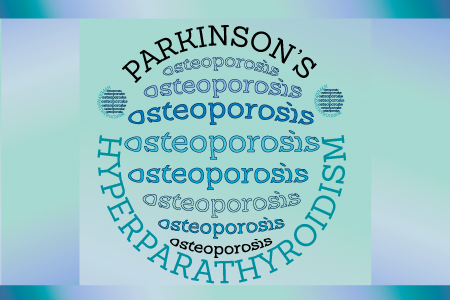How Osteoporosis Led Me to a Hyperparathyroidism Diagnosis
Written by |

A few months ago, I was flabbergasted to be diagnosed with osteoporosis.
In May 2020, I shattered the ulna in my left arm when I fell off my bike. While I suspected osteoporosis might have had a hand in such a bad fracture, I was still unprepared to receive this diagnosis. After all, I had done weight-bearing exercises — dance, racewalking, and weight training — my entire adult life. I was convinced that doing all this exercise over the years would have built stronger bones.
In my quest to find answers, I discovered that people with Parkinson’s disease have a greater risk of developing osteoporosis and breaking bones. I also learned about primary hyperparathyroidism.
Osteoporosis and Parkinson’s
Osteoporosis is fairly common in people with Parkinson’s disease. Osteoporosis and osteopenia affect up to 91% of women and 61% of men with the condition, according to a study published in Parkinsonism & Related Disorders.
General risk factors for osteoporosis include low calcium intake, family history, hormone levels, certain medications, and body frame size. For people with Parkinson’s, the duration and severity of the disease as well as reduced mobility are also risk factors.
Balance issues, a common Parkinson’s symptom, can cause unsteadiness and falls. Combined with osteoporosis, it can become a perfect storm: Osteoporotic, brittle bones and a loss of balance can lead to falls and result in fractures. For this reason, all Parkinson’s patients should be monitored for osteoporosis.
Hyperpara … what?
When I mentioned my osteoporosis diagnosis to my sister, she reminded me that she had primary hyperparathyroidism. Osteoporosis can be a sign of this disease.
Parathyroid glands regulate the body’s calcium levels. Parathyroid.com notes that hyperparathyroidism occurs when one or more of these glands grows into a tumor, resulting in the overproduction of the parathyroid hormone (PTH). This causes calcium to leach out of the bones, where it’s typically stored.
The good news is that osteoporosis resulting from hyperparathyroidism is reversible.
Why do I think I have primary hyperparathyroidism?
There are two risk factors that can put an individual at a higher risk of developing the disease, and both apply to me:
- A family history of parathyroid disease. (My sister had this disease.)
- Exposure to radiation. (In 2007, I had tonsil cancer and underwent six weeks of radiation to the neck.)
Since I was diagnosed with osteoporosis, I’m inclined to believe I may have primary hyperparathyroidism.
Parkinson’s and primary hyperparathyroidism share some common symptoms:
- Extreme fatigue
- Anxiety and depression
- Muscle weakness
The above symptoms are progressing quickly for me. I wonder if they have been exacerbated by hyperparathyroidism.
What do the specialists say?
I have gotten opinions from two of the top endocrine surgeons in New York and one of the top hyperparathyroidism specialists in the U.S. All three believe I have the disease and recommend surgery — the only way to treat and cure the disease. My blood tests show a high PTH level and a high calcium level. I also have the main risk factors and an osteoporosis diagnosis.
If the surgeon is skilled, this should be a low-risk, straightforward surgery. However, there are always inherent risks with any surgery, such as infection, bleeding, or anesthesia complications. Plus, still fresh in my mind are the pain and recovery of the three surgeries I had on my elbow last year. I also don’t look forward to a hospital stay, especially in this time of COVID-19.
So, what is my plan?
My quality of life is worsening. I have to go on autopilot to get through my exercise classes since I’m so exhausted from the moment I wake up (even after a good night’s sleep). My sister said she felt like she was “walking under water” with hyperparathyroidism. That says it all for me.
I plan to get the surgery.
When I have recovered from surgery, I hope I can say that my Parkinson’s fatigue was indeed intensified by hyperparathyroidism. Stay tuned — my journey is just beginning.
“Nothing ventured, nothing gained.” – John Heywood
Lessons learned?
When it comes to my health, I research and educate myself. I want to ask the doctors intelligent questions. Although it feels uncomfortable, and the physician might not like it, I will challenge them if necessary. It is critical to find a healthcare professional who specializes in one’s illness. I always advise seeking out a second and maybe even a third opinion.
“Doctors are wonderful people, but they don’t know everything. We’re all responsible for our own health, and shouldn’t feel guilty if we ask questions or get second opinions.” – Shannon Bream
***
Note: Parkinson’s News Today is strictly a news and information website about the disease. It does not provide medical advice, diagnosis or treatment. This content is not intended to be a substitute for professional medical advice, diagnosis, or treatment. Always seek the advice of your physician or another qualified health provider with any questions you may have regarding a medical condition. Never disregard professional medical advice or delay in seeking it because of something you have read on this website. The opinions expressed in this column are not those of Parkinson’s News Today or its parent company, Bionews, and are intended to spark discussion about issues pertaining to Parkinson’s disease.






Marcia Aulebach
Thank you I also have been dealing with for over year and relate. I found B12 shot and work with a endocrinologist to keep a eye out fir me bones.
Pls find me very FB MLee Parkinson’s group VA.
Hugs Marcia
Hi MArcia, thank you for your comment. I realllly do not want to take PRolia which is what doctor is recommending. it seems to be more trouble. and, I t ake enough drugs for PD, I dont want to add more. Do you think the B12 is helping your osteoporosis? I dont understand your response where you say 'find me'